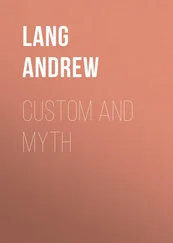Andrew Lang - Lost Leaders
Здесь есть возможность читать онлайн «Andrew Lang - Lost Leaders» — ознакомительный отрывок электронной книги совершенно бесплатно, а после прочтения отрывка купить полную версию. В некоторых случаях можно слушать аудио, скачать через торрент в формате fb2 и присутствует краткое содержание. Жанр: foreign_antique, foreign_prose, на английском языке. Описание произведения, (предисловие) а так же отзывы посетителей доступны на портале библиотеки ЛибКат.
- Название:Lost Leaders
- Автор:
- Жанр:
- Год:неизвестен
- ISBN:нет данных
- Рейтинг книги:4 / 5. Голосов: 1
-
Избранное:Добавить в избранное
- Отзывы:
-
Ваша оценка:
- 80
- 1
- 2
- 3
- 4
- 5
Lost Leaders: краткое содержание, описание и аннотация
Предлагаем к чтению аннотацию, описание, краткое содержание или предисловие (зависит от того, что написал сам автор книги «Lost Leaders»). Если вы не нашли необходимую информацию о книге — напишите в комментариях, мы постараемся отыскать её.
Lost Leaders — читать онлайн ознакомительный отрывок
Ниже представлен текст книги, разбитый по страницам. Система сохранения места последней прочитанной страницы, позволяет с удобством читать онлайн бесплатно книгу «Lost Leaders», без необходимости каждый раз заново искать на чём Вы остановились. Поставьте закладку, и сможете в любой момент перейти на страницу, на которой закончили чтение.
Интервал:
Закладка:
It was a note of Mr. Thackeray’s art, and probably one among other proofs that the higher fields of art were closed to him, that his success by no means corresponded to the amount of pains he took with his work. His drawings which appeared as steel engravings, were not unfrequently weak, while his sketches on the wood and his lithographs were much more free and masterly. There is, indeed, a sketch on the steel of poor Pen tossing feverishly in his mother’s comforting arms, which is full of passion and life and sentiment. But it was rare that success attended his ambition, and, indeed, another drawing of Pen and his mother admiring a sunset might have come out of a book of fashions of that remote period. It was in his initial letters and slight designs that Thackeray showed his best powers. There is much wistful tenderness in the little Marquise’s face as she trips down a rope-ladder in an initial letter of Vanity Fair . The bewigged shepherds and powdered shepherdesses of his favourite period are always reproduced with grace, and the children of his drawings are almost invariably charming. In the darker moods, when “man delighted him not, nor woman either,” children did not fail to please him, and he sketched them in a hundred pathetic attitudes. There are the little brother and sister of the doomed House of Gaunt, sitting under the ancestral sword that seems ready to fall. There is little Rawdon Crawley, manly and stout, in his great coat, watching the thin little cousin Pitt, whom he was “too big a dog to play with.” There is the printer’s devil, asleep at Pen’s door; and the small boy in “Dr. Birch,” singing in his nightgown to the big boy in bed. There is Betsinda dancing with her plum-bun in “The Rose and the Ring.” The burlesque drawings of that delightful child’s book are not its least attraction. Not arriving at the prettiness of Mr. Tenniel, and the elegance of Mr. Du Maurier, and falling far short of their ingenious fantasy, they are yet manly delineations of great adventures. The count kicking the two black men into space is a powerful design, full of action; and it would be hard to beat the picture of the fate of Gruffanuf’s husband. These and the rest are old friends, and there are hosts of quaint scribblings, signed with the mark of a pair of spectacles, scattered through the pages of Punch .
GOLF
While pheasant-shooters are enjoying the first day of the season, the votaries of a sport not less noble, though less noisy, are holding the great festival of their year. The autumn meeting of the Royal and Ancient Golf Club of St. Andrews is in full swing, and the words will suggest pleasant memories to many a golfer. Golf is not one of the more brilliant and famous pastimes of the day, though it yields to none in antiquity and in unassuming merit. The names of the winners of the gold medal and of the silver cross are not telegraphed all over the world as widely as Mr. Tennyson’s hero wished the news that Maud had accepted him to be. The red man may possibly “dance beneath his red cedar tree” at the tidings of the event of one of our great horse-races, or great university matches. At all events, even if the red man preserves his usual stoicism of demeanour, his neighbours, the pale-faces, like to know all about the result of many English sports the moment they are decided. Golf, as we have said, excites less general enthusiasm; but in people who love it at all, the love is burning, consuming; they will talk golf-shop in season and out of season. Few persons, perhaps, will call golf the very first and queen of games. Cricket exercises more faculties of body, and even of mind, for does not the artful bowler “bowl with his head?” Football demands an extraordinary personal courage, and implies the existence of a fierce delight in battle with one’s peers. Tennis, with all its merits, is a game for the few, so rare are tennis-courts and so expensive the pastime. But cricketers, football-players, tennis-players, would all give golf the second place after their favourite exercise; and just as Themistocles was held to be the best Greek general, because each of his fellows placed him second, so golf may assert a right to be thought the first of games. One great advantage it certainly has – it is a game for “men” of all ages, from eight, or even younger, to eighty. The links of St. Andrews are probably cleared just now of the little lads and the veterans, they make room for the heroes, the medalists, the great players – Mr. Mackay, Mr. Lamb, Mr. Leslie Balfour, and the rest. But at ordinary times there are always dozens of tiny boys in knickerbockers and scarlet stockings, who “drive out” the first hole in some twenty strokes of their little clubs, and who pass much of their time in fishing for their lost balls in the muddy burn. As for the veterans “on the threshold of old age,” it is pleasant to watch their boyish eagerness, the swaying of their bodies as they watch the short flight of their longest hits; their delight when they do manage to hit further than the sand-pit, or “bunker,” which is named after the nose of a long-dead principal of the university; their caution, nay, their almost tedious delay in the process of putting, that is, of hitting the ball over the “green” into the neighbouring hole. They can still do their round, or their two rounds, five or ten miles’ walking a day, and who can speak otherwise than well of a game which is not too strenuous for healthy age or tender childhood, and yet allows an athlete of twenty-three to put out all his strength?
Конец ознакомительного фрагмента.
Текст предоставлен ООО «ЛитРес».
Прочитайте эту книгу целиком, купив полную легальную версию на ЛитРес.
Безопасно оплатить книгу можно банковской картой Visa, MasterCard, Maestro, со счета мобильного телефона, с платежного терминала, в салоне МТС или Связной, через PayPal, WebMoney, Яндекс.Деньги, QIWI Кошелек, бонусными картами или другим удобным Вам способом.
1
Except with worm in a summer flood.
2
Perhaps an Editor put this moral in?
3
The author once caught a salmon. It did not behave in any way like the ferocious fish in this article.
4
Mr. Wordsworth, in his poem of “The Recluse,” expresses a horror of this diversion.
5
It is a melancholy fact that the Author has quite forgotten what did happen! Thus a narrative, probably diverting, is for ever lost, thanks to the modesty of our free Press.
Интервал:
Закладка:
Похожие книги на «Lost Leaders»
Представляем Вашему вниманию похожие книги на «Lost Leaders» списком для выбора. Мы отобрали схожую по названию и смыслу литературу в надежде предоставить читателям больше вариантов отыскать новые, интересные, ещё непрочитанные произведения.
Обсуждение, отзывы о книге «Lost Leaders» и просто собственные мнения читателей. Оставьте ваши комментарии, напишите, что Вы думаете о произведении, его смысле или главных героях. Укажите что конкретно понравилось, а что нет, и почему Вы так считаете.












